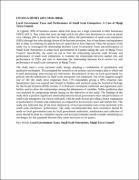| dc.description.abstract | LWANGA HENRY (2011-M102-20044)
Local Government Taxes and Performance of Small Scale Enterprises: A Case of Mpigi Town Council.
In Uganda, 90% of business owners admit that taxes are a huge constraint to their businesses UBOS (2011). They claim that taxes are high and do not allow new businesses to cover up initial cost. Odongo (2011) points out that tax mainly affects the performance of small scale enterprises (SSEs) through lost sales during closure of the business premises, loss of machinery and equipment due to delay in remitting tax and the loss of capital due to fines imposed. Thus, the purpose of the study was to investigate the relationship between Local Government Taxes and performance of Small Scale Enterprises in urban local governments in Uganda taking the case of Mpigi Town Council. Specifically, the study set out to find the relationship between trade licenses and performance of small scale enterprises, to examine the relationship between market fees and performance of SSEs and also to determine the relationship between local service tax and performance of small scale enterprises in Mpigi Town.
The study used a cross sectional study design adopting a combination of quantitative and qualitative techniques. This prompted the research to use primary and secondary data to which end it used questioning/ interviewing key informants. Documentary review on local government tax policies and documentation on small scale enterprises was employed. Out of the targeted sample size of 181 the study drew responses from 179 respondents giving a 99% response rate. Quantitative data was entered and cleaned in Epidata and analysed using the Statistical Package for the Social Sciences (SPSS) version 17.0. Pearson's correlation coefficient and regressions were further used to show the relationships among the dimensions of variables. While qualitative data was analysed by categorising themes basing on the objectives of the study. The findings of the study show a positive significant relationship between local government taxes and performance of small scale enterprises was clearly indicated, with the trade license providing a better explanation of performance of small scale enterprises as compared to local service taxes and market fees. The study also indicated that all the three dimensions of local government taxes relate positively with small scale enterprises‟ performance. The study recommended that more awareness should be made on local government taxes by local government authorities, sensitisation and collection of taxes should be done in a friendlier manner and local governments should consider abolishing tax surcharges for late payments because they cause more pain to tax payers.
Key Words: Local Government Taxes, Small Scale Enterprises, Mpigi Town Council. | en_US |


